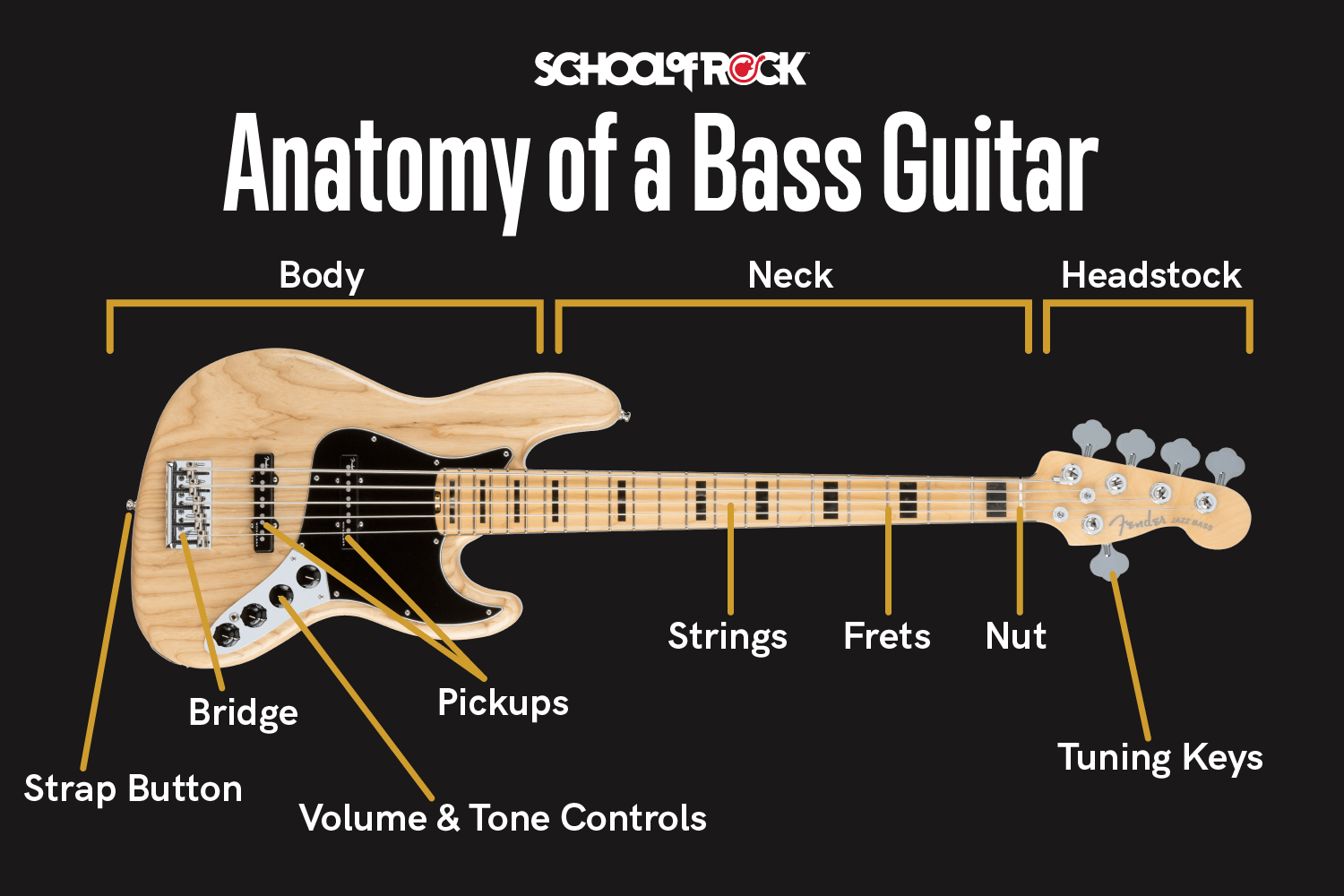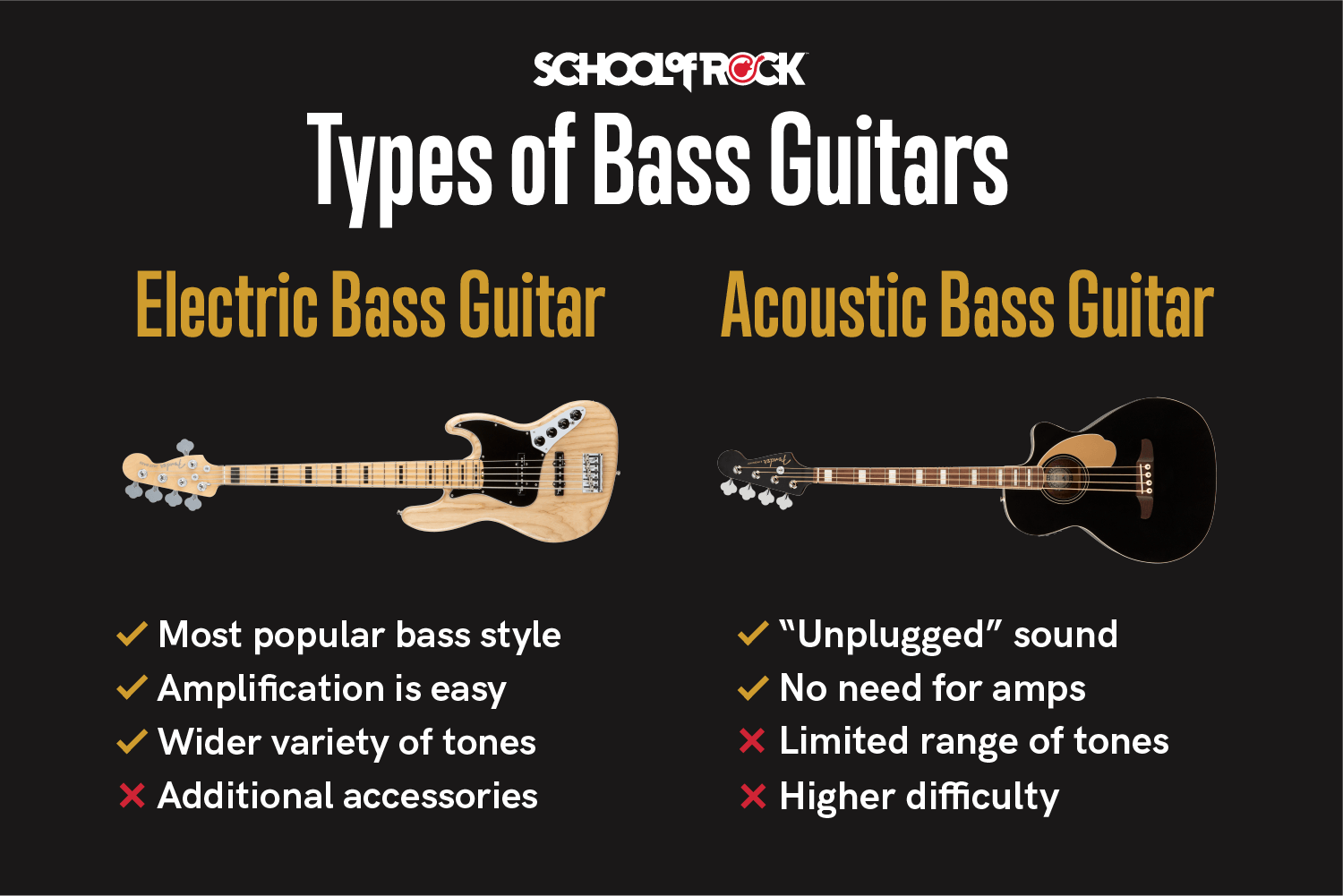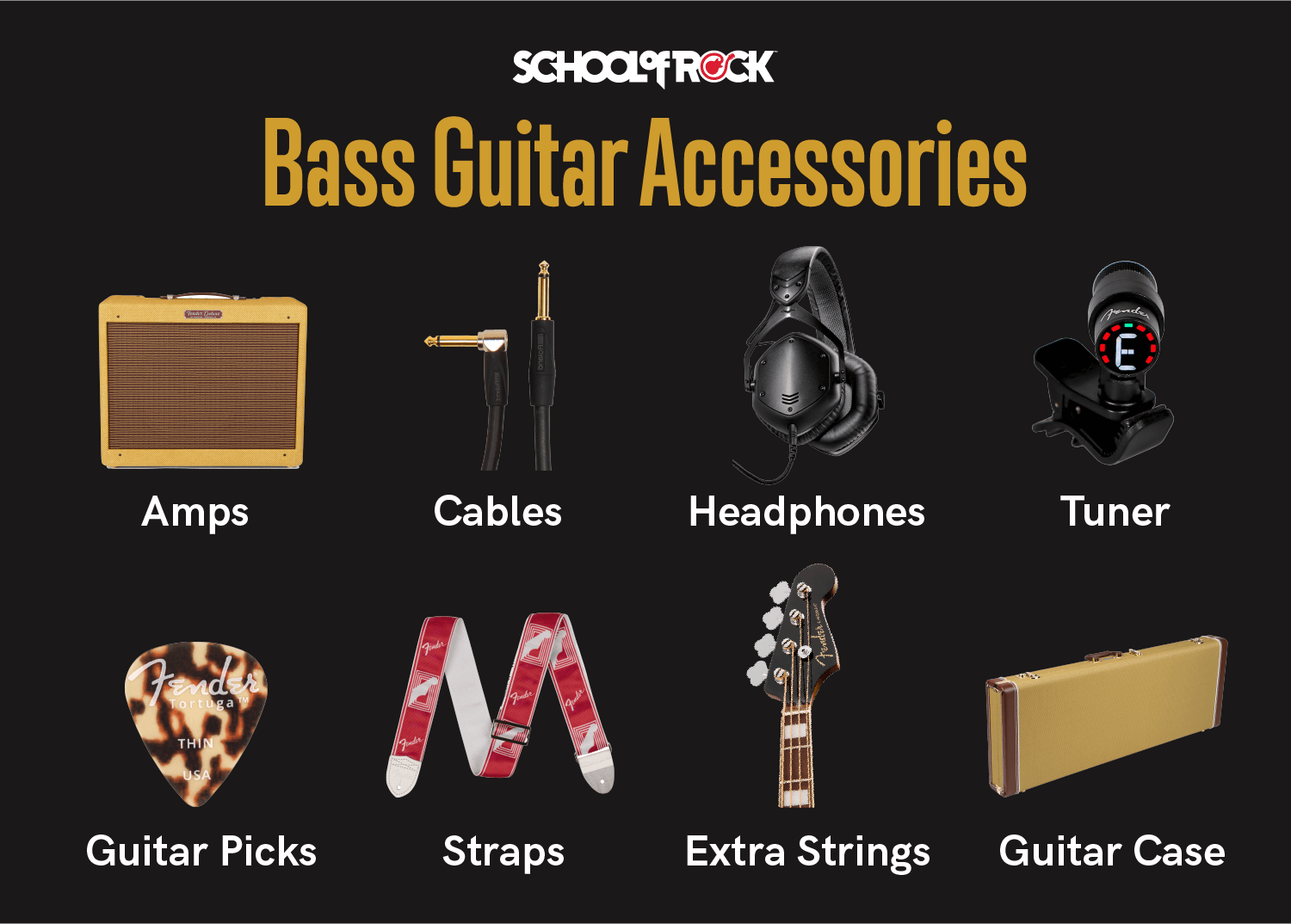So you’re looking to buy a bass guitar. Congrats! Bass guitars are exciting to play and great instruments for beginners. And when it comes to searching for a bass, there are lots of choices for good, entry-level models that won’t empty your wallet.
From selecting different types and styles to figuring out which size to buy, this handy guide to buying your first bass guitar will have you rocking out in no time!
How to buy a bass guitar for beginners
The internet is a great tool for researching different types of bass guitars, but there’s no substitute for getting a hands-on feel for the bass that best suits you. Basses come in a variety of shapes and sizes and it’s a good idea to try them out in person to get a feel for how each plays. Making the time to go to a few stores will allow you to determine how each bass fits you.
When exploring your options, it’s helpful to make a list of your favorite bassists and think about what styles of music you want to learn to play. This will help the salesperson offer suggestions on particular models that will give you the sound you’re looking for.
What to look for when buying a bass guitar
When looking for your first bass, there are many things to consider. You want a solid, well-built bass guitar that will inspire you to play. Here are a few things to look for:
- What size is it? The scale, or string length, will determine the size of the bass. Basses come in long scale and short scale; it’s important to match the size of the bass to the size of the bassist.
- Does the bass stay in tune? Tuning issues are rare with basses, as compared to guitars; the larger strings tend to be more stable. Even so, it’s a good idea to play for a bit and check your bass guitar tuning to see whether it’s stable. Being in tune will make learning easier and more fun.
- How’s the action? The action refers to how high the strings are in relation to the fretboard of the neck. High action makes playing more difficult. If the action is too low, the strings will make an unpleasant buzzing sound. Generally, you want the action to be just high enough that the strings ring true and you can press the strings down with ease.
- Are the electronics in good condition? For electric basses, make sure that you test the bass with an amplifier and that the volume and tone controls work to adjust the sound. Listen for any crackling sounds, as that may indicate some faulty electronics or loose internal wiring.
- Are the frets level? Check to see whether the frets are level and that the notes sound good all the way up and down the neck on each string. Uneven frets can cause bad notes on different parts of the neck. Run your hand up and down the neck; the frets should feel even and smooth.
- How thick is the neck width? As you look at basses, check the width of the guitar neck. Some bass guitars have wider necks than others, and a younger player could benefit from having a narrower neck that is slightly less difficult to navigate.

Different types of bass guitars
There are several different types of bass guitars. The two main categories are electric and acoustic. Electric bass guitars can be further divided into either solid-body basses or semi-hollow-body basses.
How to choose an electric bass guitar
The modern electric solid-body bass was invented in the early ‘50s by Leo Fender. It quickly became the standard for country and early rock-and-roll bands, and its role expanded even further with the advent of music genres like soul, funk and hard rock. Fender’s electric bass guitar was easier to play than the traditional upright, fretless bass — and much easier to transport. Electric bass guitars also produced a more substantial low-end rumble that filled the room.
If you want to play rock and roll, electric bass guitars are the best choice for beginners.
Advantages of an electric bass guitar
- Availability in short scales, making them accessible for younger players.
- Frequent use in most popular styles of music (and almost exclusively in rock and pop).
- Smaller size, making them easier to play than larger, acoustic models.
- Ability to produce a wide variety of tones, from smooth jazz to distorted heavy metal.
- Amplification, allowing the sound to be more easily heard and shaped by effects pedals.
Disadvantages of an electric bass guitar
- Additional accessories, which are often required and drive up the cost.
- Unsuitability to some styles like folk and world music.

How to choose an acoustic bass guitar
Acoustic bass guitars (not to be confused with upright basses) have the same shape and look as acoustic guitars. They are hollow and have a sound hole in the top. Though rarely used in rock and pop songs, they are more common in genres like folk and world music. They have a mellower sound than the electric bass.
Advantages of an acoustic bass guitar
- Woody and warm sound that’s great for playing folk music and “unplugged” jam sessions with other acoustic instruments.
- No need for amps.
- Portability.
Disadvantages of an acoustic bass guitar
- Additional equipment, which is often required to be installed so the bass can plug into an amp or sound system in order to be heard while playing with a band.
- Limited range of sounds and tones as compared to a solid-body electric bass.
- Difficulty level that’s less suitable for beginners because more effort is required to press the strings down with the fretting hand.
Fretless bass guitars and upright basses
There are two types of basses that shouldn’t be considered for beginners. Fretless electric basses, which have the metal frets that intonate the neck removed, are much more difficult to learn to play on because they require the player to have an already refined ear. Upright basses, a type of acoustic fretless bass typically used in jazz and bluegrass music, are also difficult to learn on due to their size.
Should you play a 4-, 5-, or 6-string bass guitar?
Standard electric basses have four strings, but there are many models available that have five or even six strings. While the additional strings do add an expanded range of notes, inexperienced bass players will probably want to start on a four-string bass, which is easier to learn on and by far the most common type of bass used in rock and pop music.
Fans of modern heavy metal may opt to buy a five-string as their first bass guitar since the lower range of notes available on the fifth string are commonly used in that genre. Expert players, particularly jazz musicians, may favor six-string basses, but the neck width makes playing them difficult even for adult beginners, let alone younger players.
How to choose the correct bass size
Choosing the best bass guitar size is an important consideration for any beginner. Full-scale basses are long instruments and smaller bassists may want to consider a short-scale model. For younger bassists, many manufacturers offer even smaller student sizes. To test for size, sit or stand with the bass in playing position. Your left hand should comfortably reach the first fret, with your elbow comfortably bent and relaxed.
Buying a new vs. used bass guitar
When selecting your bass guitar, it’s important to weigh the pros and cons between new and used instruments.
Advantages of buying a new bass guitar
- State-of-the-art technology.
- Manufacturer’s warranties.
- Latest looks and trends.
Advantages of buying a used bass guitar
- Vintage look and sound (especially if the look is no longer available).
- Lower price (depending on the brand).
Best bass guitar brands for beginners
Now more than ever, there are great bass guitars available that have pro-level features on a beginner’s budget.
What are some affordable bass guitar brands?
The Squier brand (manufactured by Fender, a company known to have some of the best bass guitars around) has several fantastic models that will satisfy the needs of almost any new bassist. They have several versions of their popular Fender Precision Bass and Jazz Bass guitars as well as a short-scale Bronco Bass. Likewise, Epiphone makes great affordable versions of their classic Gibson models like the EB-3 and the Thunderbird.
There are other manufacturers competing at the same price point, such as Ibanez and Yamaha, that are making instruments of comparable quality. Gretsch also carries a short-scale line that is very affordable.
What are some more expensive bass guitar brands?
If you take a step up the cost scale, there are enough options to make your head spin. There are affordable Fender Jazz and Precision basses, popular Gibson models in the SG and Les Paul styles, and upscale instruments made by a lot of other brands that are totally cool. Some lesser-known brands, such as Rickenbacker, Lakland, and Warwick, offer basses with unique looks and sounds. All these bass guitar brands have good reputations for making quality instruments — the most important thing is whether the bass inspires the student.
Should you buy an off-brand bass guitar?
Starting out on a good instrument will also make learning much easier. It’s best to skip off-brand options and go with proven manufacturers. It’s also generally a good idea to start with a slight upgrade from the starter bass guitar packs, as most students will want to quickly upgrade after a few months. By buying a better bass, you will not only save money in the long run but also be happier and more inspired to practice. Playing a recognized brand makes a beginner feel like a pro and gives them confidence.

Getting started with bass accessories
To get started, you’ll need the following bass guitar accessories:
- Amps. An amplifier is necessary for an electric bass guitar. Try to find one with a headphone jack for practice.
- Instrument cable. The instrument cable is used to connect your bass guitar to your amp. Make sure the cable is long enough to reach a chair or stool.
- Headphones. Headphones are great to plug in whenever you practice and can usually be plugged into an amp. This will keep it quiet for family or neighbors.
- Tuner. Most electric bass guitars require a tuner that can be plugged into. Many tuner models are relatively inexpensive.
- Guitar picks. Guitar picks are used to strike and pluck the strings. They are often made of plastic and come in a variety of different thicknesses. School of Rock recommends medium-size picks for beginners.
- Straps. The strap keeps your instrument on your body as you play. Most straps are adjustable, so make sure your bass guitar sits comfortably before you start playing.
- Extra strings. It’s always important to have extra strings on hand in case any break. Make sure to buy strings that will work with either your acoustic or electric bass guitar.
- Instrument case. To protect your bass guitar, School of Rock recommends you get either a hard case or a padded gig bag that’s easy to carry. Hard cases usually offer greater protection for higher cost instruments.
What happens next?
We hope that with this guide makes buying your first bass guitar an easy, exciting and affordable experience. Make sure you try out several models to find the one that best fits your size, plays well and has the sound and style that you like. And there’s no better place to start learning to play your bass than the School of Rock.
We specialize in teaching beginners to play bass guitar and getting them playing with others almost immediately. Our staff of professional musicians will not only teach you how to play but also help you with picking out that first instrument that will start you on your musical journey.






